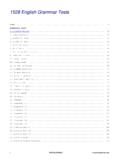Transcription of ANNEX A1 - OECD
1 ANNEX A1. Print reading sample tasks The print reading sample tasks are examples of questions students answered in the PISA 2009 survey to assess their competencies in reading printed text. Note that the numbering of the questions is identical to the numbering used in the test booklets given to students. PISA 2009 ASSESSMENT FRAMEWORK KEY COMPETENCIES IN READING, MATHEMATICS AND SCIENCE OECD 2009. 173. ANNEX A1 Print reAding SAmPle tASkS. PRINT READING UNIT 1. Macondo Dazzled by so many and such marvellous inventions, the people of Macondo did not know where their amazement began. They stayed up all night looking at the pale electric bulbs fed by the plant that Aureliano Triste had brought back when the train made its second trip, and it took time and effort for them to grow accustomed to its obsessive toom-toom.
2 They became indignant over the living images that the prosperous merchant Don Bruno Crespi projected in the theatre with the lion-head ticket windows, for a character who had died and was buried in one film, and for whose misfortune tears of affliction had been shed, would reappear alive and transformed into an Arab in the next one. The audience, who paid two centavos apiece to share the difficulties of the actors, would not tolerate that outlandish fraud and they broke up the seats. The mayor, at the urging of Don Bruno Crespi, explained by means of a proclamation that the cinema was a machine of illusions that did not merit the emotional outburst of the audience. With that discouraging explanation many felt that they had been the victims of some new and showy gypsy business and they decided not to return to the movies, considering that they already had too many troubles of their own to weep over the acted-out misfortunes of imaginary beings.
3 Macondo is a piece of prose from the novel One Hundred Years of Solitude by the Colombian author Gabriel Garcia M rquez. It is classified as belonging to the personal situation because it was written for readers' interest and pleasure. The Macondo unit in PISA is introduced with a brief paragraph to orientate the reader: The passage on the opposite page is from a novel. In this part of the story, the railway and electricity have just been introduced to the fictional town of Macondo, and the first cinema has opened.. The people's reaction to the cinema is the focus of the passage. While the historical and geographical setting of the extract is exotic for most readers, going to the movies is within the experience of 15-year- olds, and the characters' responses are at the same time intriguing and humanly familiar.
4 Within the continuous text format category, Macondo is an example of narrative writing in that it shows, in a manner typical of this text type, why characters in stories behave as they do. It records actions and events from the point of view of subjective impressions. question 1: mAcondo What feature of the movies caused the people of Macondo to become angry? .. 174 PISA 2009 ASSESSMENT FRAMEWORK KEY COMPETENCIES IN READING, MATHEMATICS AND SCIENCE OECD 2009. ANNEX A1 Print reAding SAmPle tASkS. Framework Characteristics Situation Personal Medium Print Text format Continuous Text type Narration Aspect Integrate and interpret: Develop an interpretation Question intent Infer a reason for characters' behaviour Item format Open constructed response CODING GUIDE.
5 code 2: Refers to the fictional nature of movies or more specifically to actors reappearing after they have died . May quote directly from the third sentence ( ..a character who had died and was buried in one film, and for whose misfortune tears of affliction had been shed, would reappear alive and transformed into an Arab in the next one ) or the last phrase ( the acted-out misfortunes of imaginary beings. ). People who they think have died came back to life. They expected the films to be true and they aren't. They think that the man in the film has pretended to die, and that they are being taken for fools. A character who had died and was buried in one film would reappear alive in the next one.
6 They don't understand that the films are fiction. Because actors whose characters had died in the previous film returned as new characters in the next film. The audience felt they were being robbed of their emotions. [Elements of both 2 and 1.]. They thought they had enough problems of their own without watching pretend people act out problems. [Clear understanding of the part fiction plays in the people's anger, though has taken it a stage further.]. Because one of the actors was buried in the film and he came back as an Arab. [Marginal: very specific.]. Partial credit code 1: Refers to fraud or trickery, or to the audience's thwarted expectations. May quote directly that outlandish fraud or the victims of some new and showy gypsy business.
7 They think they are being defrauded. Because they feel they have wasted their emotions for nothing. They felt they had been the victims of some new and showy gypsy business. They would not tolerate that outlandish fraud. Because they paid 2 centavos apiece for that outlandish fraud they could not tolerate. [Partly direct quotation from lines 9-10; not specific reference to the nature of the fraud.]. Because they were unaware of the workings of it. [Take as a way of saying fraud (general).]. No credit code 0: Gives insufficient or vague answer. They were angry with Bruno Crespi. They didn't like the films. They want to get their money back. PISA 2009 ASSESSMENT FRAMEWORK KEY COMPETENCIES IN READING, MATHEMATICS AND SCIENCE OECD 2009.
8 175. ANNEX A1 Print reAding SAmPle tASkS. They thought they had been victims. They were violent. They were stupid. They are expressing their feelings. They paid 2 centavos and didn't get what they wanted. [ What they wanted is too vague.]. OR: Shows inaccurate comprehension of the material or gives an implausible or irrelevant answer. They felt they shouldn't be bothered with other people's problems. [Wrong: the people DID want to be bothered with REAL people's problems.]. It's the only way they have of protesting at wasting their money. They were angry because they had to see a person that was dead and buried. [The quoted section gives the sense of they did not like seeing dead people in films incorrect interpretation.]
9 ]. code 9: Missing. The text positions the reader at a distance albeit a sympathetic distance from the people of Macondo. To gain full credit for this item, it is necessary to stand outside the text and recognise the difficulty these unsophisticated villagers have in coming to grips with the difference between fiction and real life. For most modern readers, this difficulty would seem unusual, and contrary to expectations. Just over half of the students in the field trial were able to demonstrate that they could develop this interpretation. The partial credit response requires a less challenging imaginative act on the reader's part: understanding that people get angry if they feel that they are being tricked is, for most people, quite easy to imagine.
10 This kind of answer gains partial credit because it is not wrong but it only tells part of the story. Although a relatively small percentage of students in the field trial gave this kind of response, their overall reading ability was substantially lower than that of those who gained full credit. question 3: mAcondo At the end of the passage, why did the people of Macondo decide not to return to the movies? A. They wanted amusement and distraction, but found that the movies were realistic and depressing. B. They could not afford the ticket prices. C. They wanted to save their emotions for real-life occasions. D. They were seeking emotional involvement, but found the movies boring, unconvincing and of poor quality.













